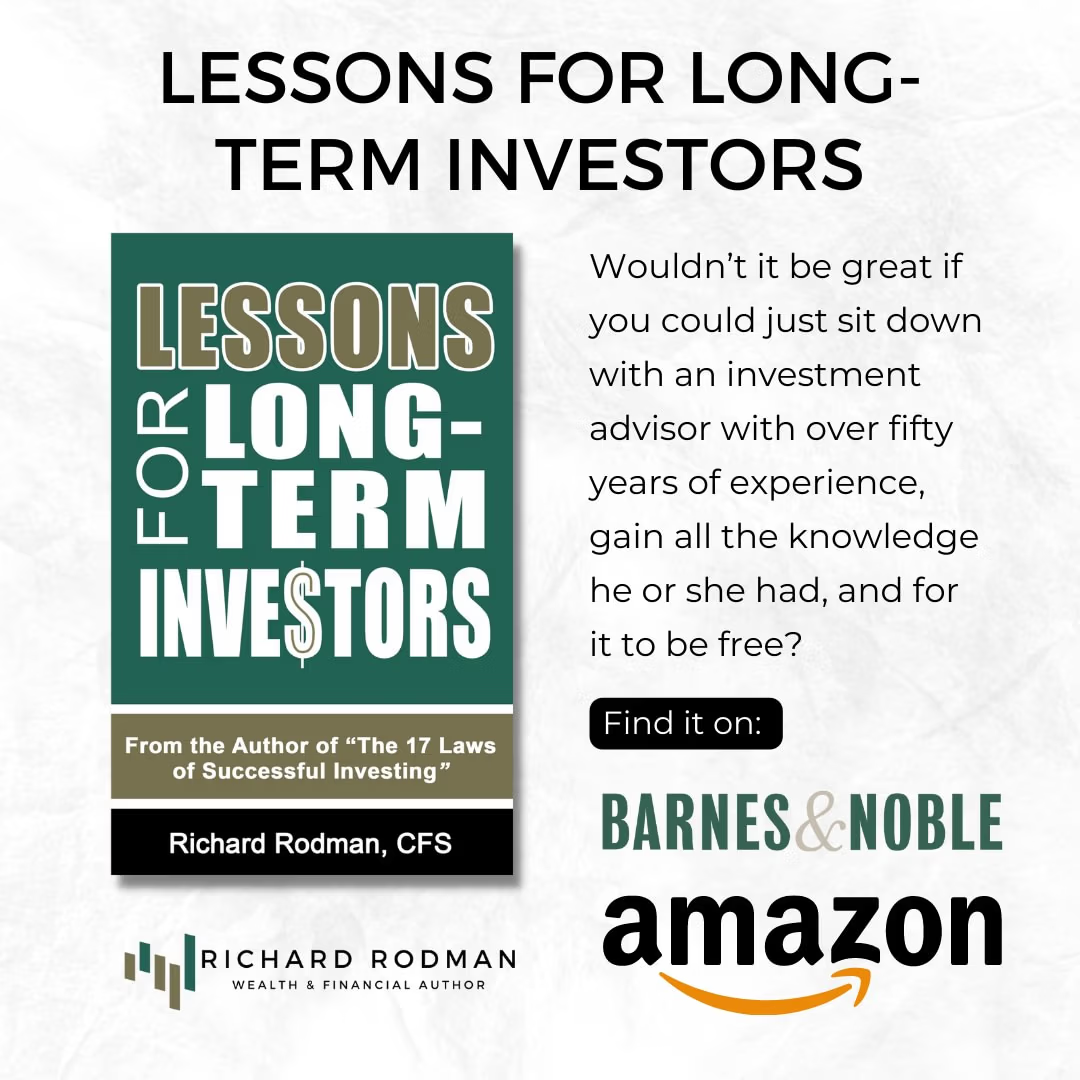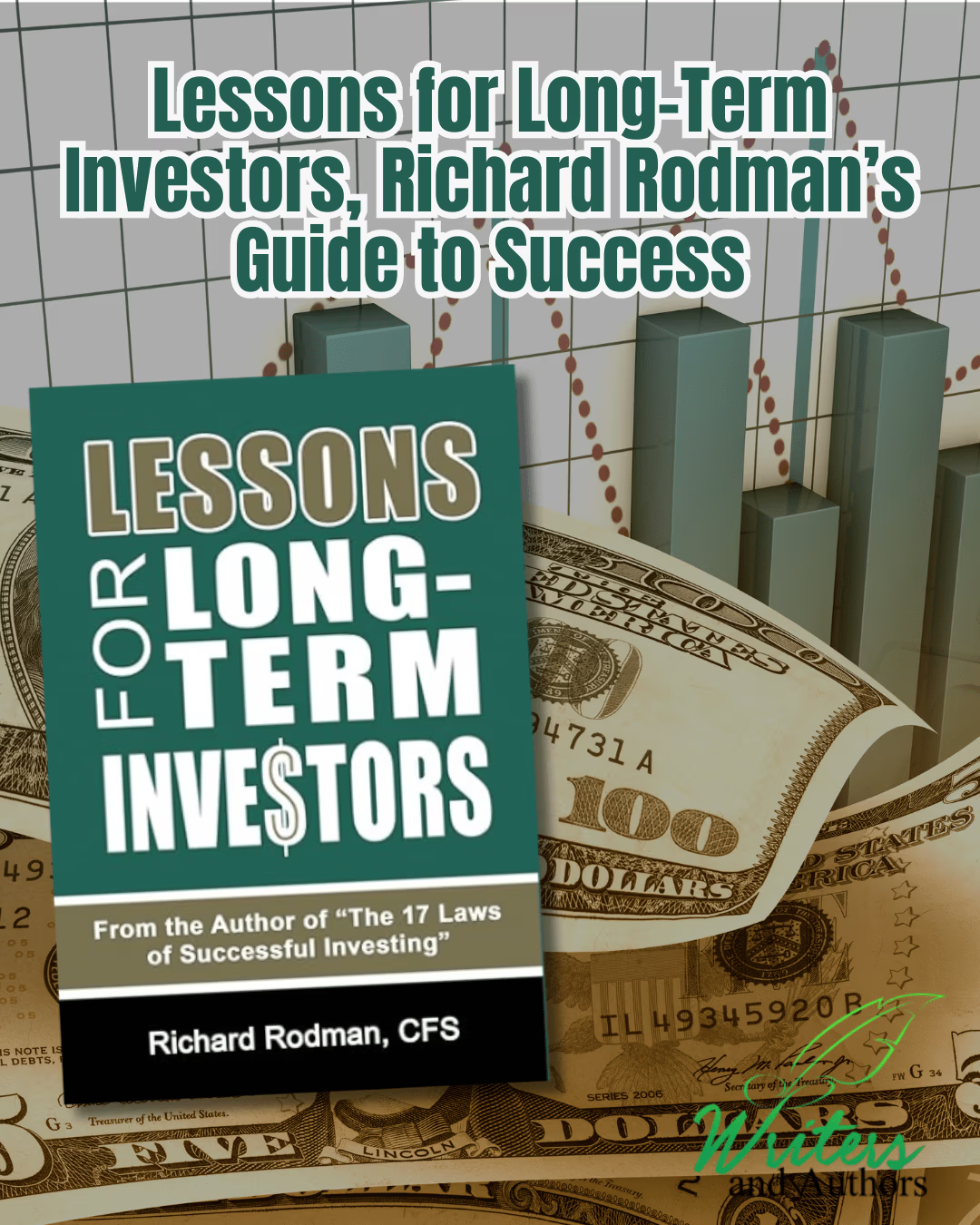With a career steeped in observing individuals’ investment journeys, author Richard Rodman was motivated to address a critical gap: the lack of long-term perspective in investing. He shares, “Looking back over my 50+ year career, I’ve witnessed many individuals investing without considering the long-term. Overreacting to market news often leads to missteps. I felt a reset was necessary for a significant portion of investors to gain the knowledge and perspective essential for better investing.” Through this interview, Rodman sheds light on the advantages of a long-term approach, mental shifts required, showcasing its power, and strategies for managing emotions during market turbulence, offering invaluable insights into successful investment principles.
 What motivated you to write Lessons for Long-Term Investors?
What motivated you to write Lessons for Long-Term Investors?
What motivated me to write this book is that on looking back over my 50+ year career I have seen a fair amount of people investing on their own. Without the perspective of long-term investing and overreacting to good and bad news, I thought that a reset was for much of the investing population to gain the knowledge and perspective to invest better.
What are some key advantages that investors can expect to gain from adopting a long-term approach?
The advantages of long-term investing speak for themselves. The biggest one is that investors can be confident in the fact that they don’t need to constantly be right in their trades. The long-term, if correctly researched and thought through, lead to better results. The advantages of long-term investing are that one can better manage money on one’s own knowing they have a very long history of financial markets, they can lean on when times are difficult and not be emotionally swayed by both good and bad news.
Long-term investing requires a different mindset compared to short-term trading. What are some of the mental shifts that investors should make when transitioning to a long-term investment strategy?
In transferring from a short-term mentality to a long-term mentality it takes away that emotionalism associated with short-term thinking, which will be appealing to investors. This will give them a lot of the reasoning of why to make the change, as most investors get fed up with the emotional issues and difficulty eventually in short-term trading.
Could you share one or two compelling stories that illustrate the power of long-term investing in action?
One would be Warren Buffet. He has successfully used compound interest over time which has
enhanced his performance over time. His record speaks for itself.
Market volatility can test the resolve of long-term investors. How do you address the
topic of managing emotions and staying the course during turbulent market periods in
your book?
It is done two ways. First, when things get emotionally charged, ask yourself if your financial goals have changed. If your portfolio is built around long-term investing as it should be (hence the title of my book Lessons for Long-Term Investor, then short term swings shouldn’t matter and no action should be taken. In the words of Gene Farma Jr., a famous economist “Your money is like a bar of soap. The more you handle it the less you will have.” Secondly, as mentioned, trust history. In a down cycle just wait it out if nothing has changed fundamentally with your individual positions. A disciplined approach to investing will win the day. Yes, it is sometimes boring and sometimes maddening, but it does work.
Sustainable investing and ESG considerations are increasingly important to many investors. How does your book explore the integration of environmental, social, and governance factors into long-term investment decisions?
My book does not address this subject as it is a personal value judgement. However, it has been
shown in some studies that ESG investing does produce enhanced results at times if all other
things are equal.
“Time in the market, not timing the market” is a common adage for long-term investors. Could you elaborate on this principle and discuss how you emphasize it in your book?
It is so true. In my 50+ years in this business I have never seen anyone be successful at it consistently. Many have tried and I am not sure why.
Throughout your book, you share practical strategies for selecting investments with long-term potential. Could you give us a sneak peek into some of the criteria or methodologies you suggest readers use for making such decisions?
This depends on how you are investing, whether it be in individual stocks, mutual funds, or exchange traded funds. Each is evaluated differently, and each investor has to figure that out and be content with their conclusions. That said, traditional fundamental and technical analysis is the foundation. I encourage each investor to be well versed in both before investing.
Tax implications can significantly impact an investor’s returns. How does your book
guide readers on tax-efficient strategies for their long-term portfolios?
For the most part, I tend to ignore tax implications. It is one of the Laws in the book. Good decisions trump tax planning. That said, there are choices that pop up which need to be addressed. For example, if a stock needs to be sold and there is just one week to go before it is considered and long-term gain with less tax due, then maybe that is the best course.
 Financial literacy is essential for successful long-term investing. How do you address the importance of educating oneself about investment principles and concepts in your book?
Financial literacy is essential for successful long-term investing. How do you address the importance of educating oneself about investment principles and concepts in your book?
It is extremely important. As mentioned, Fundamental Analysis and Technical Analysis need to be learned to a considerable degree before investing. There are many great books on each subject.
In the ever-evolving landscape of finance, technological advancements can play a role in shaping investment strategies. How does your book tackle the integration of technology and data analytics in the context of long-term investing?
This is a wonderful question. My personal feeling is that artificial intelligence will have a role in investing now and mostly in the future. However, I am firmly of the belief that human intuition which is gained through real life experiences will be worth more than most technological advancements.
For readers who are new to investing, what foundational knowledge or key concepts do you ensure are covered in your book to help them build a strong understanding of long- term investment principles?
The key concepts are to know yourself first. What are your goals and objectives? How much time do you have to devote to your investments? If it is not a lot for example, maybe most of your portfolio should be in mutual funds or exchange traded funds rather than individual stocks which take more time.
Long-term goals often encompass retirement planning and financial security. Can you provide insights from your book on how readers can align their long-term investment strategies with their retirement aspirations?
Another good question. Time is our most important asset. As you get closer to retirement most individuals get more conservative in their investment choices. However, we are all living longer, so even if you are of retirement age there still needs to be planning done for quite a few years in most cases. I would stay with a decent amount of stocks in retirement (in addition to bonds and cash) depending on your risk tolerance.
Finally, what do you hope readers will take away from Lessons for Long Term Investors? Are there any overarching messages or actionable steps that you encourage them to implement in their investment journeys?
Yes, Start Now in investing or Start Changing how you do things now, hopefully using a lot of
the concepts mentioned in the book. May you all experience a successful journey. The idea of course is to have your money work as hard for you as you did for it.
Find the Author
Lessons for Long Term Investors
Master These Lessons and Become a Successful Investor!
 Do you want to create more wealth? Do you want to maintain or even add to your standard of living now and during retirement? Now you can if you follow the concepts of this book. With this book, noted investment consultant Richard Rodman shows you:
Do you want to create more wealth? Do you want to maintain or even add to your standard of living now and during retirement? Now you can if you follow the concepts of this book. With this book, noted investment consultant Richard Rodman shows you:
- A wealth creation formula that WORKS!
- How to manage fear and greed–the two emotions that preclude sound investing
- How to put financial markets in their proper perspective and not in the perspective of the media, which mostly reports on short term market swings
- How to capitalize on bad news and market turmoil
This book is a distillation of over 50 years of sound investment advice and practice. It is a companion book to Rodman’s first book, The 17 Laws of Successful Investing, and companion text to his popular seminar, How to Create and Manage Wealth, as well as continuing education material for CPAs. In clear language and powerful examples compiled from many years of his newsletters, Rodman makes long-term investing understandable, easy, and attainable for virtually anyone in any income bracket. In these pages you will hopefully discover a new financial reality in today’s tumultuous world. Your future may actually depend on following these time-honored concepts. Ignore them at your own financial risks.





















